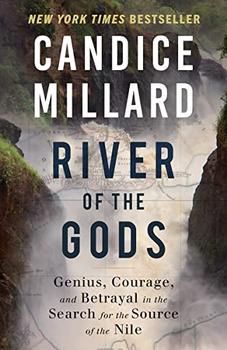Summary | Excerpt | Reviews | Beyond the Book | Readalikes | Genres & Themes | Author Bio

Genius, Courage, and Betrayal in the Search for the Source of the Nile
by Candice MillardChapter One
A Blaze of Light
Sitting on a thin carpet in his tiny, rented room in Suez, Egypt, in 1854, Richard Francis Burton calmly watched as five men cast critical eyes over his meager belongings. The men, whom he had just met on the Hajj, the annual Islamic pilgrimage to Mecca, "looked at my clothes, overhauled my medicine chest, and criticised my pistols," Burton wrote. "They sneered at my copper-cased watch." He knew that if they discovered the truth, that he was not Shaykh Abdullah, an Afghan-born Indian doctor and devout, lifelong Muslim but a thirty-two-year-old lieutenant in the army of the British East India Company, not only would his elaborately planned expedition be in grave danger, but so would his life. Burton, however, was not worried. Even when his new friends found his sextant, the most indispensable, and obviously Western, scientific instrument in his possession, he did not think that he had anything to fear. "This," he later wrote, "was a mistake."
Burton's goal was to do something that no other Englishman had ever done, and that few had either the ability or audacity to do: enter Mecca disguised as a Muslim. It was an undertaking that simultaneously acknowledged what was most sacred to the Muslim faith and dismissed the right to protect it, making it irresistible to Burton, who studied every religion and respected none. The birthplace of the prophet Muhammad, Mecca is the holiest site in Islam and, as such, forbidden to non-Muslims. Burton knew that, "to pass through the Moslem's Holy Land, you must either be a born believer, or have become one," but he had never even considered performing the Hajj as a convert. "Men do not willingly give information to a 'new Moslem,' especially a Frank [European]: they suspect his conversion to be feigned or forced, look upon him as a spy, and let him see as little of life as possible," he wrote. "I would have given up the dear project rather than purchase a doubtful and partial success at such a price." An Oxford dropout, self-taught scholar, compulsive explorer, and extraordinarily skilled polyglot, Burton wanted unfettered access to every holy site he reached, the trust of every man he met, and the answer to every ancient mystery he encountered—nothing less, he wrote, than to see and understand "Moslem inner life." He also wanted to return to England alive.
By disguising himself as a Muslim, Burton was risking the righteous wrath of those for whom the Hajj was the most sacred of religious rites. Although "neither the Koran nor the Sultan enjoins the killing of Hebrew or Christian intruders," he knew, "in the event of a pilgrim declaring himself to be an infidel, the authorities would be powerless to protect him." A single error could cost him his life. "A blunder, a hasty action, a misjudged word, a prayer or bow, not strictly the right shibboleth," he wrote, "and my bones would have whitened the desert sand."
Burton's plan, moreover, required crossing the Rubʿ al-Khali—"Empty Quarter"—the world's largest continuous desert and, in his words, a "huge white blot" on nineteenth-century maps. So ambitious was the expedition that it had captured the attention of the president of the Royal Geographical Society, Sir Roderick Impey Murchison. For Murchison, who had helped to found the Society nearly a quarter of a century earlier, this was exactly the kind of exploration that the Society had been created to encourage. He "honored me," Burton wrote, "by warmly supporting . . . my application for three years' leave of absence on special duty." The East India Company, a 250-year-old private corporation with armies of its own, had argued that the journey was too dangerous and that Burton, who had made more enemies than friends during his years in the military, should be given no more than a one-year furlough. The Royal Geographical Society stood by its promise to help finance the expedition. For a challenge of this magnitude, Murchison believed, Burton was "singularly well-qualified."
Excerpted from River of the Gods by Candice Millard. Copyright © 2022 by Candice Millard. All rights reserved. No part of this excerpt may be reproduced or reprinted without permission in writing from the publisher.
Your guide toexceptional books
BookBrowse seeks out and recommends the best in contemporary fiction and nonfiction—books that not only engage and entertain but also deepen our understanding of ourselves and the world around us.